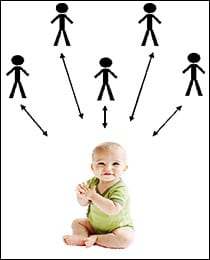
Nicole Burke,
Graduate Student
The relationships between social networks and social cognition has been widely studied in adults, adolescents and even primates. Even though there is a breath of literature exploring infant social cognition, relatively little is known about infant social networks. The limited work that has explored children’s social networks has narrowly looked at the way Network Size impacts development. While Network Size is an important aspect of children’s social life, there are many ways that children’s social relationships can vary; the people in children’s networks can be different races, speak different languages, do different kinds of activities with the child, and how emotionally close the child feels toward that infant. In one line work, our lab is descriptively exploring infants’ and children’s social networks. Using the Infant Social Relationship Questionnaire, a measure developed by our group, we can ask: What is the structure of infants’ and children’s social networks? On what dimensions do infant and children networks vary?
 In another line of work, we ask more directly: In what ways do variations in children’s social networks impact their social cognitive development? While the relationship between social networks and social cognition is widely studies in adults, adolescents, and primates, there is relatively little work exploring this relationship in infants and children. Using the Infant Social Relationship Questionnaire and in-lab experiments, we can explore how social experience affects perspective taking, communication skills, and social bias.
In another line of work, we ask more directly: In what ways do variations in children’s social networks impact their social cognitive development? While the relationship between social networks and social cognition is widely studies in adults, adolescents, and primates, there is relatively little work exploring this relationship in infants and children. Using the Infant Social Relationship Questionnaire and in-lab experiments, we can explore how social experience affects perspective taking, communication skills, and social bias.

 In another line of work, we ask more directly: In what ways do variations in children’s social networks impact their social cognitive development? While the relationship between social networks and social cognition is widely studies in adults, adolescents, and primates, there is relatively little work exploring this relationship in infants and children. Using the Infant Social Relationship Questionnaire and in-lab experiments, we can explore how social experience affects perspective taking, communication skills, and social bias.
In another line of work, we ask more directly: In what ways do variations in children’s social networks impact their social cognitive development? While the relationship between social networks and social cognition is widely studies in adults, adolescents, and primates, there is relatively little work exploring this relationship in infants and children. Using the Infant Social Relationship Questionnaire and in-lab experiments, we can explore how social experience affects perspective taking, communication skills, and social bias.